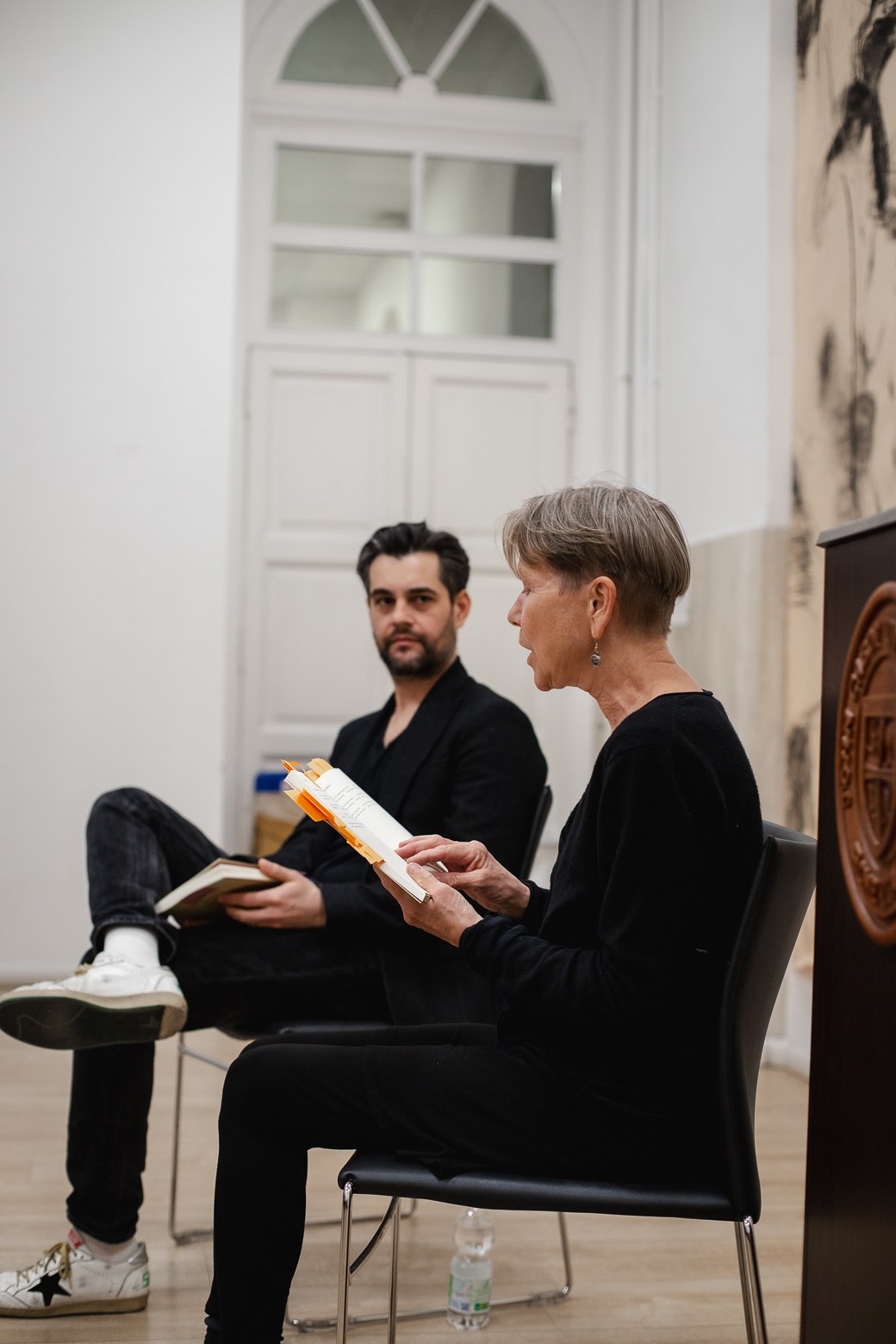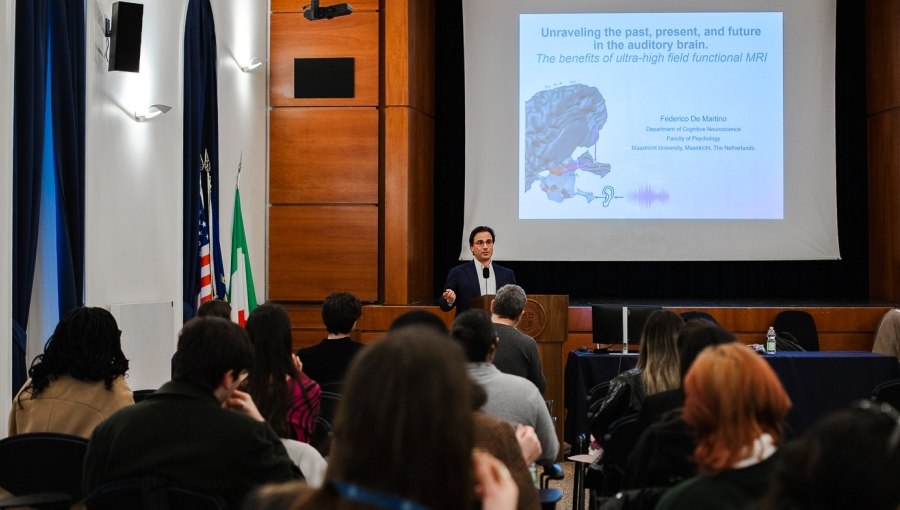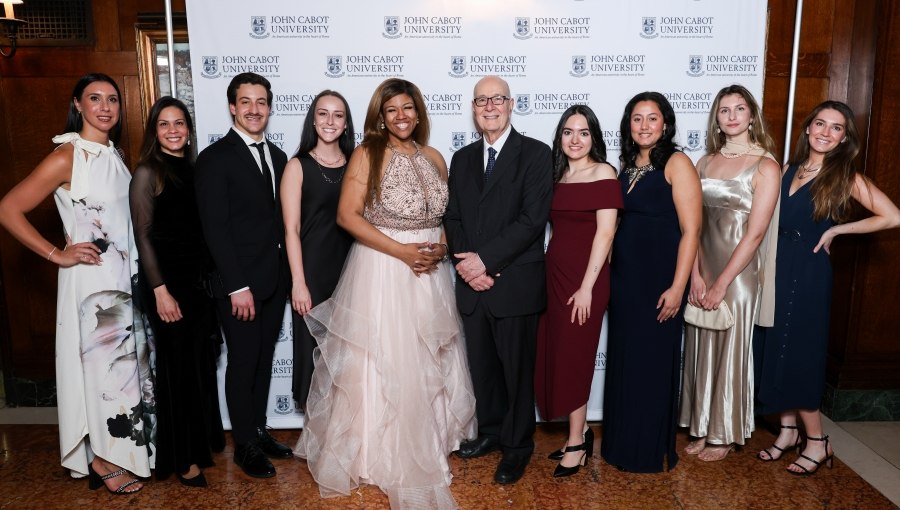Translating the Untranslatable: Cole Swensen and Alessandro De Francesco
On March 21, 2025, John Cabot University had the pleasure of hosting American poet Cole Swensen and her Italian translator, Alessandro De Francesco, for a reading and discussion of their new collaborative edition of Swensen’s 2012 poetry collection Gravesend (Arcipelago itaca, 2024). The event was sponsored by the Departments of English Language and Literature and Modern Languages and Literature.

Cole Swensen is the author of 19 books of poetry, a collection of hybrid poetic essays, Art in Time, and a volume of critical essays, Noise that Stays Noise. A former Guggenheim Fellow, recipient of the Iowa Poetry Prize, the SF State Poetry Center Book Award, the National Poetry Series, and the PEN USA Award in translation, she also translates poetry and art criticism from French.
Alessandro De Francesco is a poet, translator and lecturer at the Accademia Albertina in Turin and the Bern Academy of the Arts. He has published E agglomerati, degli alberi o (2023), ((( (2020) and La visione a distanza (2018), all three with Arcipelago itaca. He also translates French, German and American poetry.
The reading was followed by a discussion animated by questions from the audience, which included many members of JCU’s Literature and Creative Writing Club. Themes spanned from the unique professional relationship between translator and author, to the obscure nature of poetry and the process of translation from a more dominant language.
Translating the Untranslatable: Fidelity Between Languages
After an introduction by creative writing Professor Will Schutt, the first part of the evening was dedicated to the reading of a selection of poems from Gravesend, first from the Italian translation, read by De Francesco, and subsequently from the original text, read by Swensen. As the poet said in her introduction, “Leading with the translation helps underscore the relationship between the two versions. A translation is not just a stand-in for an original text, but in fact, it is an original text in its own right.”

As De Francesco said, “To me, a translation is a service that you do for a friend, and the friend is first of all the text. There is some sort of fidelity, especially between two languages like Italian and English, which, at the end of the day, are not so different.”
“I see translation and writing as complementary,” said Swensen. “Fidelity is something that translators are always aware of – the fact that you can betray a text as much by trying to be too faithful to it as by letting fidelity go by the wayside.”
Translating the Untranslatable: A Matter of Being Haunted
Starting from the title of the event, the speakers discussed the untranslatability of certain words and expressions from English to Italian. “One thing to do is angle the translation more into what is called cultural translation,” said De Francesco. “Instead of translating what the words say, you’re translating the cultural instance that would express that same word.”
However, as De Francesco clarified, “you’re not going to be able to catch everything: you can see it as a way of distorting the meaning, or you can see it in a much more optimistic way. I tend towards settlement – I add something to the initial text.”
A question from the audience led to the reflection on the apparently obscure nature of poetry. To this, Swensen replied: “What distinguishes poetry from other forms of written language is the fact that it includes not only what is said, but also something that is left unsaid. What is unsaid also cannot be translated, and yet you have to account for it in the translation, which must be ‘haunted’ by that which cannot be said in the same way that the original is.”
This may lead to confusion in the reader, but it is the nature of poetry to be up for interpretation. As De Francesco said, “Poetry is just the tip of the iceberg. It is a verbal manifestation of an excess that is packed into language in a way that we don’t clearly understand.” That excess, as explained by the translator, is a third element that comes out in the process of translation from the original to the final text: “That element could be seen as a ghost in itself – a presence and an absence at the same time.”
Translating the Untranslatable: Dominant Languages in Poetry
Another question from the audience led to a reflection on the dominant nature of some languages today. As explained by Swensen and De Francesco, in a globalized world, languages that are spoken more than others, like English, tend to feed on the “dominated” languages to improve and expand their vocabulary and potential expressiveness, as well as assert their perspectives across all literary genres.
“Poetry is important for many reasons, but one of them is that it reactivates the possibilities of language and offers the opportunity to look at it from another perspective, to broaden its expressive potential,” concluded De Francesco.





